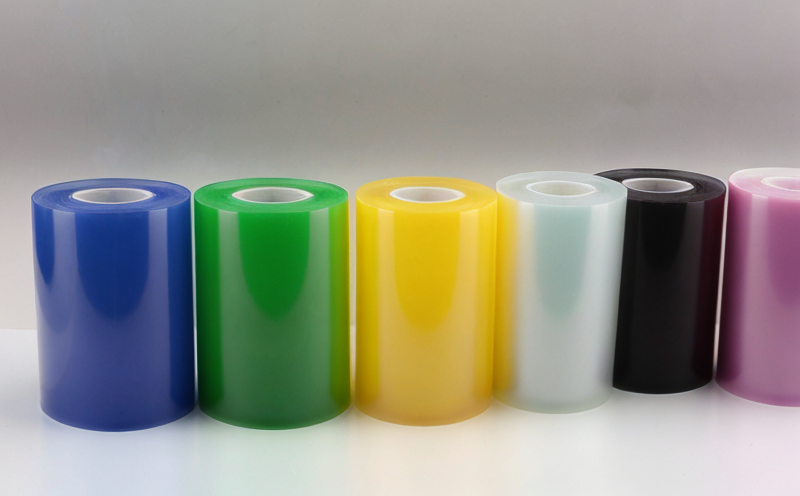ASTM D882 Tensile Testing of Thin Plastic Films
The ASTM D882 standard test method is one of the most widely used in the industry for evaluating the tensile properties of thin plastic films. This service ensures that manufacturers and quality assurance professionals can accurately measure key mechanical properties such as tensile strength, elongation at break, yield strength, and modulus.
The primary application areas include packaging films, medical device components, and other industries where thin plastic films are used extensively. The test is particularly relevant for ensuring the integrity of materials that undergo stretching or bending stresses during use.
Our laboratory follows strict procedures to ensure accurate results. Specimens are prepared in accordance with ASTM D882 guidelines, which specify dimensions and orientation requirements to minimize variability. Testing is conducted on state-of-the-art tensile testers capable of providing precise measurements down to very low sample sizes.
The process begins with careful selection of the appropriate specimen size and shape according to the standard. Samples are then conditioned in a controlled environment before testing to ensure consistent results. The test involves applying a known load at a constant rate until failure occurs, recording the force versus elongation curve during this process.
Results from these tests provide critical insights into how well the material will perform under stress conditions it may encounter in its intended application. This information is invaluable for optimizing product design and ensuring compliance with regulatory requirements.
| Sample Preparation | Testing Parameters | Data Collection |
|---|---|---|
| Dimensions per ASTM D882 | Loading rate, temperature, humidity | Force vs. elongation curve |
| Conditioning time | Environmental conditions during testing | Specimen dimensions post-test |
The data collected is then analyzed and reported according to ASTM D882 specifications. Reports include detailed descriptions of the test setup, sample preparation methods, environmental conditions, and a comprehensive summary of the mechanical properties determined.
Our team works closely with clients throughout the testing process to ensure that all aspects meet the desired standards. We offer additional support services such as consultation on material selection, failure analysis, and assistance in interpreting results within broader context.
Scope and Methodology
The ASTM D882 standard specifies procedures for determining tensile properties of thin plastic films. It covers the determination of tensile strength, elongation at break, yield strength, and modulus using a constant-rate-of-extension test method.
| Scope | Methodology |
|---|---|
| Determination of tensile properties | Constant rate of extension |
| Thin plastic films only | Loading at specified rates |
| Temperature and humidity control | Elongation measurement |
The test involves preparing specimens according to the specified dimensions and orientations. Samples are conditioned under controlled environmental conditions before testing. The test is performed at a constant rate of extension until failure occurs.
Data collected includes force versus elongation curves, which provide valuable information about the mechanical behavior of the material during loading. Post-test analysis focuses on determining various tensile properties based on this data.
International Acceptance and Recognition
- ASTM D882 is widely recognized in North America, Europe, Asia-Pacific region for its accuracy and reliability.
- It is often used as a benchmark standard by regulatory bodies when evaluating compliance with international standards.
- The test results are accepted across many countries due to their consistent application of the same methodology worldwide.
- Companies around the globe rely on ASTM D882-tensile testing data for quality control purposes and product development.
- Many industry associations recommend using this standard as part of their quality assurance programs.
The widespread adoption reflects the high level of trust placed in the accuracy and repeatability of results produced by this method. By adhering to ASTM D882, organizations can ensure that their products meet global standards and expectations consistently.
Competitive Advantage and Market Impact
Tensile testing according to ASTM D882 provides significant competitive advantages in the market. Accurate tensile strength measurements help companies design more durable, reliable products that meet customer needs better. This ensures higher product performance which can lead to increased market share.
Compliance with international standards like ASTM D882 demonstrates a company’s commitment to maintaining high-quality standards and adhering to best practices in the industry. It enhances credibility among customers and stakeholders by showing that rigorous testing procedures are followed.
Moreover, having access to detailed tensile property data allows manufacturers to optimize their processes continuously. This leads to improved efficiency, reduced waste, lower production costs, and ultimately better value propositions for end-users.
By leveraging our expertise in ASTM D882-tensile testing services, clients gain a competitive edge by staying ahead of regulatory changes and market trends. Our rigorous quality control measures ensure that every measurement meets the highest industry standards, providing peace of mind to those responsible for ensuring product safety and efficacy.





